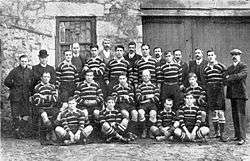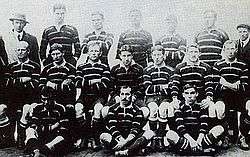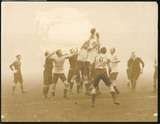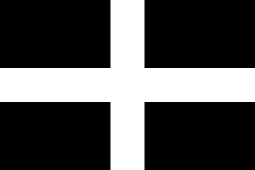Rugby union in Cornwall
 | ||
| Full name | Cornwall Rugby Football Union | |
|---|---|---|
| Union | RFU | |
| Founded | 1883 | |
| Region | Cornwall | |
| ||
| Official website | ||
|
cornwall-rfu | ||
Rugby union in Cornwall is one of the county's most popular sports and has a large following in Cornwall. The followers of the county side are dubbed Trelawny's Army. In 1991 and 1999 Cornwall made the County Championships finals, played at Twickenham Stadium, with Cornwall beating first Yorkshire and in 1999 Gloucestershire to win the cup.
Cornish rugby has produced many fine rugby players who have played at international level including Phil Vickery, Trevor Woodman, (both England), Brian 'Stack' Stevens (England and British and Irish Lions), Graham Dawe (England), along with Andy Reed who has represented Scotland and the Lions, and many others.
Also, the Cornish rugby team can boast an Olympic silver medal. In 1908, they won the County Championship for the first time, and the prize was to represent Great Britain at rugby in the 1908 Olympic Games. They lost to Australia 32-3 in the final, and remain the only county side to represent Great Britain at rugby in the Olympics.
CRFU
The Cornwall Rugby Football Union (CRFU) was formed in 1883. It is a union of 39 rugby union clubs which includes most rugby union clubs in Cornwall (St Columba and Torpoint RFC are part of the Devon Union), the open-age Cornwall representative side and representative teams at various age groups. The CRFU are members of the Rugby Football Union (RFU), the governing body for rugby union in England. The CRFU organizes three annual knockout cup competitions - the Cornwall Super Cup, Cornwall Cup and Cornwall Clubs Cup, with the Cornwall Cup stretching back to 1967. The Cornwall Super Cup is played between the Launceston and Redruth (doubling up as National League 2 South league games between the sides), the Cornwall Cup is for teams based between tiers 6 and 12 in the English league system and finally the Cornwall Clubs Cup is for teams in the regional Cornish leagues. The Cornwall Cup used to be the premier competition with the top sides such as the Cornish Pirates, Launceston, Mounts Bay and Redruth taking part but has been superseded in recent years by the Super Cup, itself downsized to just the two teams due to the demands of the modern game both in terms of fixture congestion and the increased physical toll on players. All cups are currently sponsored by Tribute Ales.
History


The Cornish rugby tradition has deep roots, stretching back before the game was even codified. A form of folk football, known as Cornish hurling was highly popular there, and is still played in two towns in Cornwall. It is possible that the former popularity of this game paved the way for the rugby code. Their rugby jerseys with gold and black hoops were introduced in 1885.
Cornish Rugby has had the honour to have played host to many international touring rugby teams over the years including New Zealand, Australia, South Africa, New Zealand Māori, France, Romania, the USA, Canada, Japan and the Soviet Union.
One of the most important times of the year in a Cornish rugby fan's calendar is the County Championship. Like the 1900 games, three teams entered: Australasia (representing Australia and New Zealand), France, and Great Britain (which included the whole of the United Kingdom of Great Britain and Ireland). France pulled themselves from the event prior to the commencement of the tournament, being unable to field a representative team. Cornwall won the championship for the first time in 1908, when they played in front of 17,000 fans at Redruth. The game was against Durham, also known for its mining, this time coal not tin. Cornwall won the game 17-3, scoring 5 tries. The added incentive for the winner was the chance to represent Great Britain at the 1908 Summer Olympics. The choice of Cornwall was controversial, as only three of their players had ever represented England, as well as the fact that Australia, who had been on a tour of the United Kingdom, had defeated them 18 points to five.[1]

Two other countries entered the 1908 Summer Olympics, France and Australasia, the name of a combined team from Australia and New Zealand. France withdrew before the tournament which left Great Britain (Cornwall) playing Australasia. The final score was 32-3 to Australasia with Bert Solomon managing to score a try for Great Britain.
Australasia's team, the Wallabies, was already on tour in Britain, while the best Anglo-Welsh players were on tour in New Zealand at the time.[2] Great Britain was therefore represented by the Cornwall county team, who were chosen by the RFU as an appropriate side after they defeated Durham in the 1907 English county championship.
As expected, Australasia defeated Great Britain, claiming the gold medal, the score being 32 points to three. The match at the White City Stadium was played under poor conditions, in fog and with a slippery field.[3]
Cornwall reached the Championship final again in 1909, 1928, 1958, 1969 and 1989 but had to wait until 1991 before re-claiming the trophy. In a final that most Cornish fans will remember forever, Cornwall played Yorkshire at Twickenham in front of 54,000 fans, the majority of which were supporting Cornwall. In a game that had everything, from a Cornish point of view, all seemed lost when after 54 minutes, Cornwall found themselves trailing at 16-3 down, having been tricked when Yorkshire ran a penalty that the Cornish believed they had indicated to kick. That one moment changed the course of the game and Cornwall fought back to draw level at 16-16 after 80 minutes. They even missed the conversion that would have given them victory in normal time. The game then went into extra time when Cornwall managed to continue their scoring.
The final score was 29-20 to Cornwall which sent the Cornish fans into a state of total elation. The Cornish tries were not pretty but no one cared. Richard Nanckivell's two tries were the inspiration that they could win and Tommy Bassett and Billy Peters put the icing on the cake in extra-time. Cornwall's first title since 1908.[4]
Cornwall managed to reach the final again in both 1992 and 1998, unfortunately losing both and it was not until 1999 when they met Gloucester in the final that Cornwall managed to win the Championship again.
Cornwall play most of their home games at Redruth R.F.C. and Camborne RFC but matches have also been played at Penzance & Newlyn and Launceston.
The premier club side in Cornwall are the Cornish Pirates (recently renamed from Penzance & Newlyn RFC) who play in the RFU Championship. They are hoping to increase their fanbase by appealing to Cornish nationalist sentiment to help them gain promotion to the Aviva Premiership. Launceston RUFC ("The Cornish All Blacks") have recently (2007 season) been promoted to the National Division One. Redruth R.F.C. ("The Reds") play in National Division Two and also get good support. Mount's Bay have this season 2007/08 began their campaign in National Division Three, South, leading the league for the entire season they are at season end promoted to National Division Two for the 2008/09 season. The other major Cornish club sides who play in the South West 1, 2 West, Western Counties West and Cornwall & Devon leagues are Bude, Camborne, Falmouth, Hayle, Newquay Hornets Penryn, St. Austell, St. Ives, Saltash, Truro and Wadebridge Camels.
Motto
Fethy Po Fyllel An Gwarry Ha Tra Nahen! (Cornish for "Win or Lose, The Game and Nothing Else" !)
1908 Centenary celebration match
As part of the centenary celebrations, the British Olympic Association arranged a match between Australia and the Barbarians which was held at Wembley Stadium on 3 December 2008. The Barbarian players, who normally wear their club socks, all wore black and gold socks to represent Cornwall, in a game which Australia won 11-8.[5]
Cornish International and touring club friendlies
- New Zealand 1905, 1924 (at Camborne RFC)
- Australia 1908 (twice) - GB Olympic Silver medal (at Camborne RFC and White City Stadium)
- South Africa 1906,1912 (at Redruth RFC)
- Maoris 1926 (at Falmouth RFC)
- Sélection française 1969 (at Clermont Ferrand)
- France "B" 1970 (at Redruth RFC)
- Comité de Rugby du Lyonnais 1971,1972 (at Vienne and Camborne RFC)
- Romania 1972 (at Redruth RFC)
- USA 1977 (Cornwall won 12-11) (at Camborne RFC)
- Canada 1979 (at Redruth RFC)
- South African Barbarians 1979,1993 (at Camborne RFC and Redruth RFC)
- Japan 1986 (at Camborne RFC)
- NZ Barbarians 1987 (at Redruth RFC)
- Soviet Union (12 - 12) 1989 (at Redruth RFC)
- Ulster 1991 (at Redruth RFC)
- Ulster 1992 (at Belfast)
- Crawshays RFC (at Camborne RFC)
- Diok 1993(at Leiden, Netherlands)
- Hilversum 1993 (at Hilversum)
- Impalas 1993 (at Amersfoort)
- Cork Constitution 1993 (at Redruth RFC)
- Canterbury (NZ) 1994 (at Camborne RFC)
(Cornwall players have also represented Cornwall & Devon and South-West Division teams)
County championship finals
As of 2016 Cornwall have won the Bill Beaumont Cup (county championship) 5 times: 1908, 1991, 1999, 2015 & 2016
| Year | Winners | Home Team | Score | Away Team | Venue | Notes |
|---|---|---|---|---|---|---|
| 1908 | Cornwall | Cornwall | 17–3 | Durham County | Recreation Ground, Redruth | |
| 1909 | Durham County | Durham County | 12–0 | Cornwall | West Hartlepool | |
| 1928 | Yorkshire | Yorkshire | 12–8 | Cornwall | Bradford | |
| 1958 | Warwickshire | Warwickshire | 16–8 | Cornwall | Coundon Road, Coventry | |
| 1969 | Lancashire | Cornwall | 9–11 | Lancashire | Recreation Ground, Redruth | |
- From 1984 the Championship finals were played at Twickenham:
| Year | Winners | Score | Runner's Up | Venue | Notes |
|---|---|---|---|---|---|
| 1989 | Durham County | 13–9 | Cornwall | Twickenham | |
| 1991 | Cornwall | 29–20 | Yorkshire | Twickenham | AET[6] |
| 1992 | Lancashire | 9–6 | Cornwall | Twickenham | |
| 1998 | Cheshire | 21–14 | Cornwall | Twickenham | |
| 1999 | Cornwall | 25–15 | Gloucestershire | Twickenham | |
| 2001 | Yorkshire | 47–19 | Cornwall | Twickenham | |
| 2013 | Lancashire | 35–26 | Cornwall | Twickenham | [7] |
| 2014 | Lancashire | 35–26 | Cornwall | Twickenham | |
| 2015 | Cornwall | 18-13 | Lancashire | Twickenham | |
| 2016 | Cornwall | 35-13 | Cheshire | Twickenham | |
Players with 50+ Caps for Cornwall
- 102 Tony Cook
- 88 C. R. Johns; 86 P. J. Hendy; 83 C. B. Stevens; 70 Richard Jackett
- 69 D. Weeks; 68 J. May; 67 R. G. Corin; 65 J. Atkinson; 64 G. Bate; 62 R. F. S. Harris; 61 R. Jennings; 60 H. Stevens; 60 P. J. B. Mitchell
- 56 R. Keast; 56 A. Bick; 55 T. A. Pryor; 54 T. Bidgood; 54 R. W. Hosen; 54 G. Williams; 53 C. J. Durant; 53 P. J. Winnan; 52 T. Palmer; 52 Nicholas Tregurtha; 52 K. C. Plummer; 51 A. L. Semmens; 51 G. Champion; 50 Edward Jackett; 50 A. Williams; 50 B. J. Trevaskis; 50 K. Thomas
Cornish players to have toured with the British and Irish Lions
- Edward Jackett (Australia and New Zealand 1908)
- J. Davey (Australia and New Zealand 1908)
- F.S. Jackson (Australia and New Zealand 1908)
- B.B. Bennetts (Argentina 1910/11)
- R. Jennings (Australia and New Zealand 1930)
- V.G. Roberts (Australia and New Zealand 1950)
- M.C. Thomas (Australia and New Zealand 1950 & 1959)
- R.A.W.Sharp (South Africa 1962)
- C.B.Stevens (Australia and New Zealand 1971)
- A. Reed (New Zealand 1993)
- P. Vickery (Australia 2001, South Africa 2009)
See also
References
- ↑ "Rugby at the Olympics". rugbyfootballhistory.com. Retrieved 15 May 2006.
- ↑ "A short but eventful Olympic Rugby history". sportnetwork.net. Retrieved 21 May 2006.
- ↑ Bill Mallon and Ian Buchanan (2000). The 1908 Olympic Games - Results for All Competitors in All Events, with Commentary. McFarland. ISBN 0-7864-0598-8.
- ↑ 1991 Cornwall win at Twickenham
- ↑ "Barbarians 11-18 Australia". bbc.co.uk. 3 December 2008. Retrieved 26 January 2013.
- ↑ Ellis, Ross (20 April 2011). "Cornish rugby winners remembered 20 years on". BBC Sport, British Broadcasting Corporation. Retrieved 12 March 2013.
- ↑ "County Championship: Cornwall 25-36 Lancashire". BBC. Retrieved 27 May 2013.
[Olympic 'spirit' too much for Cornwall rugby team against Australia in 1908]
